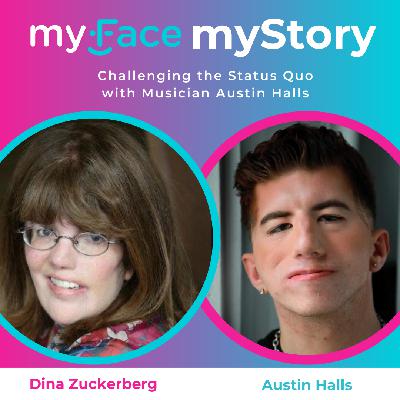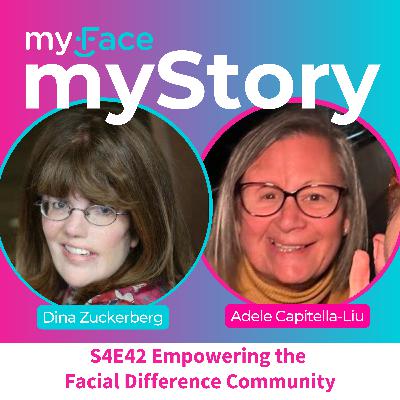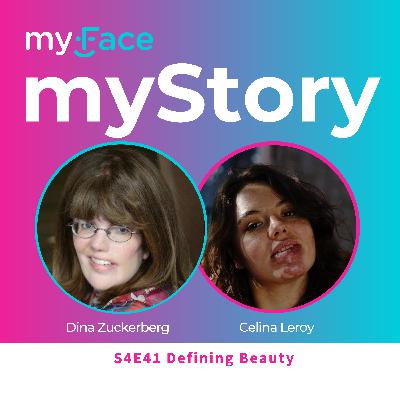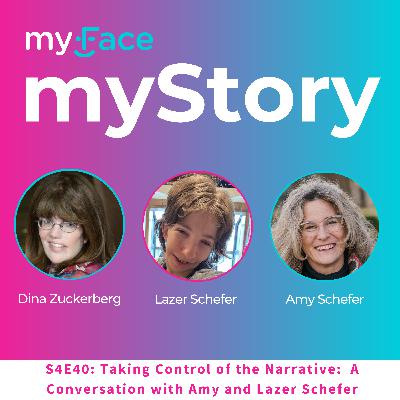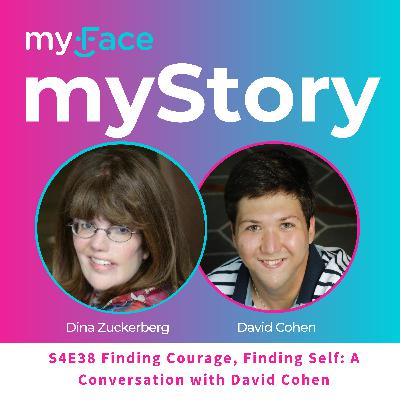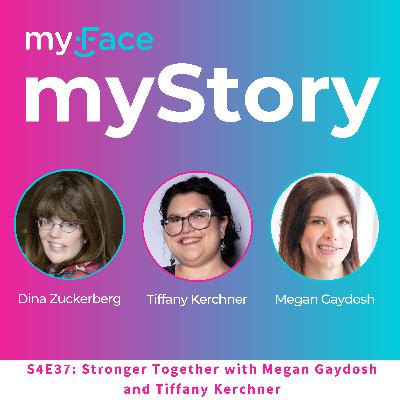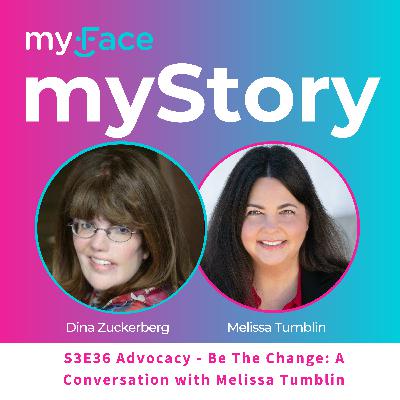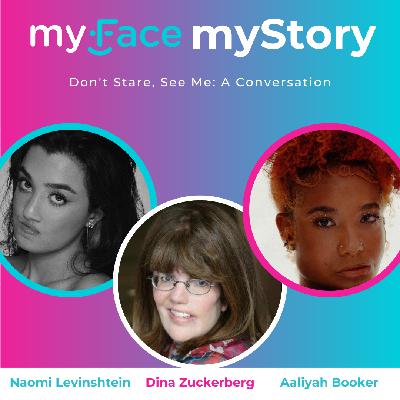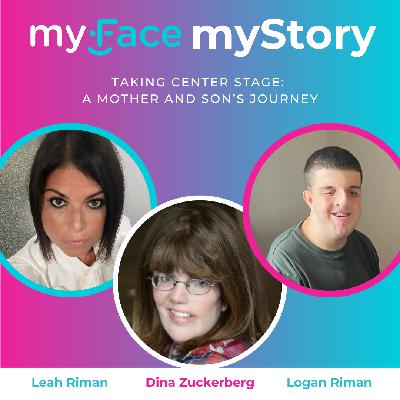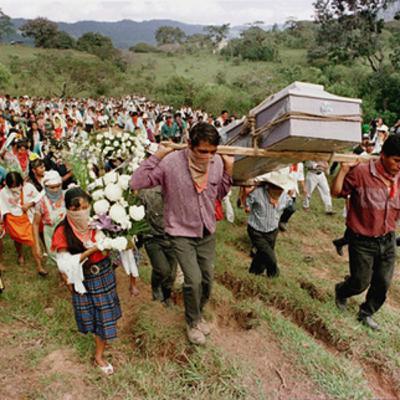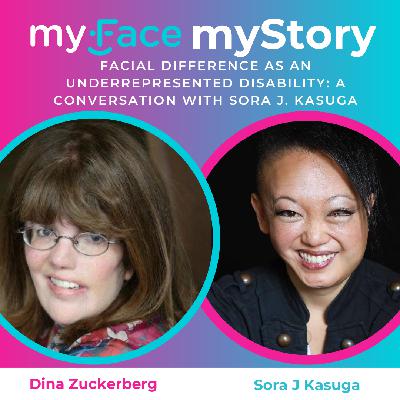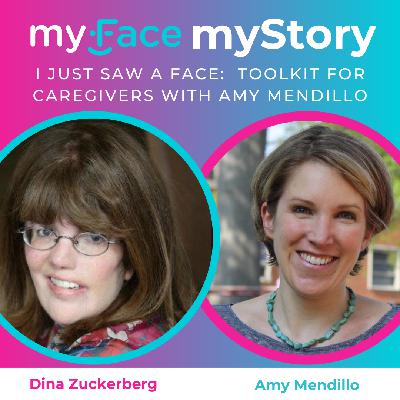Challenging the Status Quo with Musician Austin Halls
Description
On this month's myFace, myStory podcast episode, host Dina Zuckerberg is joined by Austin Halls born with Moebius Syndrome. He has incorporated his psychology degree, his journey, and his music to promote that you can love yourself and overcome any challenge that comes your way. Austin will share his journey to the musician and now model that he is today.
- [Announcer] Welcome to My Face, My Story, Voices from the Craniofacial community, with your host, Dina Zuckerberg.
- Hello and welcome to My Face, My Story, Voices from the Craniofacial Community. Whether you're watching on YouTube or listening on Apple Podcasts, click subscribe now so you'll never miss a future episode. And if you're a fan of My Face, My Story, rate and review the program on Apple's podcast so we can get our message of inclusivity and empowerment to more people. I'm your host, Dana Zuckerberg, the Director of Family Programs at My Face. I was born with a cleft lip, a hearing loss, and no vision in my left eye. My face, My story is about people like us being seen and heard, about sharing stories within the craniofacial community and with others. Today I will be joined by Austin Halls. Austin is a positive force changing how people view themselves and the world around them. Austin was born with a rare syndrome called Moebius syndrome making him born with facial paralysis. At the age of 25, he has been through four facial surgeries just to smile. The doctor said he would never be able to eat orally, and at the age of three, he has proven the doctors wrong. He has carried this attitude with every aspect of his life. Austin's strives to incorporate his degree in psychology, his story and his music to promote that you can love yourself and you can overcome any obstacle that comes your way. Austin has been a lover of fashion, style and art since he was young due to him not being able to show expression through his face. Being a professional recording artist, he has since released two albums and a powerful pop dance song called "Disabled" reclaiming the identity of being disabled. Welcome, Austin.
- Hello. I'm so happy to be here.
- Yes, I'm really looking forward to our conversation.
- Me too.
- Yes. So for those who may not know, can you tell us about your facial difference and how, well, you've talked about how many surgeries you've had, but tell us a little bit more about your facial difference and what it means.
- Yes. So Moebius syndrome is a super rare syndrome. The chances of getting this syndrome are two people out of a million. That's what I say, I'm two in a million. But with this syndrome, it is where the sixth and seventh cranial nerves are under developed. So I cannot move my face really at all. And I also cannot move my eyes laterally. So my face and my eyes are paralyzed. I also cannot blink. So I used to win all the staring contests in my school.
- Love that.
- But yeah, it's mostly facial paralysis. And just like any other disability, there's a spectrum and I'm very happy to have a more milder face. Some people have missing limbs, some people have tracheas. I had to have a feeding tube, like you said. So it just depends on the person. But facial paralysis is the biggest thing with Moebius syndrome.
- Okay. So just outta curiosity, when you sleep at night, are you able to close your eyes?
- So people have told me, because obviously I can't know myself, but my eyes close about like 90% of the way. So like, I think when I am, I can't really blink, so my eyes look super, super dry. I have eyedrops on me at all times. But when I am sleeping, people have confirmed I'm not sleeping with my eyes open and I'm happy because that sounds a little scary if I was just sleeping like this. So, yeah. So I think at night, it's closed like 90% of the time. I do wake up and I'm always like, my eyes are always burning, which is like just a classic case of Moebius.
- Right, right. So can you share with us your personal journey, what it was like for you growing up?
- I feel like my childhood was very, very, very normal. And I hate that word normal because everybody is normal, normal is literally just a made up word. But I feel like, the first three years of my life, I was in the hospital, it was back and forth. I was just really having a hard time adapting to, you know, this world. And after I got my feeding tube out and I kind of became, you know, stable in all medical issues, I kind of just lived the life that everyone else lived. I really didn't talk about my disability. It wasn't really in the forefront. I knew that I was different because I didn't see anyone with a facial difference. So I knew that I did have a disability, but I just lived, you know, my life knowing that I am just Austin. And I'm very happy that I grew up in a small school of 26th people, kindergarten through sixth grade. And it was just a really nice, like, they don't care about my syndrome. They just knew me. And my parents always pushed me to be vocal and to get myself out there. So I feel like a lot of the disability story is parents trying to protect them and almost coddle them where that could kind of limit their, you know, confidence, self-esteem. My parents were complete opposites and threw me out there and said, you're gonna go baby, and you're gonna talk to them and you're gonna do everything for yourself because as an adult, I'm not gonna be there to do everything for you.
- Yeah, I feel like in some ways my parents always led me to believe I could do anything I wanted. There were no real limitations to the differences that I had. So I can relate a little bit to that. I also went to a very small school as well, so. So how do you think your journey with Moebius syndrome has shaped the person you have become today and your outlook on life?
- I think that I would be a completely different person. There's like a dichotomy of, I was just talking about this, like, there's a dichotomy of like Austin with Moebius and then Austin without Moebius. And I really do believe like Austin with Moebius is a lot nicer, a lot kinder, a lot more empathetic. And I think we really do live a different path of the road that people don't even know is a thing. And I just think being, you know, being a different kind of minority group and going through this world with different experiences, you really learn what it's like to be on different sides of the field. I feel like, like I never want anyone to feel the way that I was growing up, especially if my bullying was, you know, a lot of it was a lot of like microaggression. It was a lot of staring, it was a lot of, you know, questioning my intelligence. And I know that's a huge thing in the facial difference community. We get just undermined in a lot of aspects of our life. So I feel like we have learned how to treat other people nicely, nicer and kinder and just be more empathetic for people. So I think Moebius has given me so many like just tools to be a better human being. And I think about like Austin without Moebius would just be a tornado and just going through life and just not even questioning anything. So I've gained so much like wisdom. I'm only 25, I'm gonna be 26 next a month and I tell people that I'm emotionally like 87 years old.
- Right, right. Yeah, I couldn't have said it better myself 'cause all the things you just said I think of like... I mean I think we are more empathetic, we are more aware, we are so much because of experiences of growing up with a craniofacial difference. And then at the same time it's just a part of who we are. There was so much more than a craniofacial difference.
- Do you feel that, I know this is your interview, but I would love to know how you feel about, you know, I think a lot of people on social media only see us talking about our identity of being disabled. And it's really funny because people comment and they're like, why are you only talking about your disability? And it's so funny. Do you feel like there's such a, I say dichotomy, said it twice, but like dichotomy of like normal life, you are not really talking about your disability but then your social life, you're only talking about your disability because it's so important.
- Right. Well, it's interesting for me, I grew up never talking about it when I was younger. And so it was only, it started maybe in my early twenties like you. And then it really, I think took off in the last 10 years, 10, 15 years, but really in the last 10 years when it came to my face. And then I started going into schools and speaking to kids, which you've done with me as well. And it's sort of opened up my world. And I found the more I shared my story, the more people could relate and especially within the community to say, wait. And then I realized, wait, I'm not the only one that felt that way. Like, I thought I was the only one that felt that way growing up. So it's been, and I don't think I would necessarily go back and change it. Like I feel like because of my experiences, it's made me the person I am today. And I wouldn't be doing the work that I do if not the experiences that I had. So I'm not sure I would change anything. Do I wish sometimes it could have been a little easier? For sure. But I think it's shaped the person I've become. And I have found the more I share my story, the more people even outside the community can sometimes relate to what I'm saying 'cause they have their own insecurities or they have their own experiences. And so yeah, it's been a journey.
- I think vulnerability is like the biggest thing. I think just like anyone with a disability, without a disability, like just being vulnerable. Like you said, sharing your story. Like people are, I think just trying to relate to anything nowadays. Like I feel like it's just hard to connect. Everyone's on their phone. You know, with the whole pandemic,

